How Can We Help Treat Muscle Tears & Strains
Muscle injuries can happen suddenly or develop from overuse. At Fit2Function Clinics, we provide evidence-based treatment to help you recover safely and fully.
What you can expect:
- Diagnosis to identify the type and severity of strain
- Manual therapy to improve flexibility and reduce pain
- Progressive strengthening program
- Shockwave and Laser Therapy to promote healing
- Expert advice for preventing re-injury
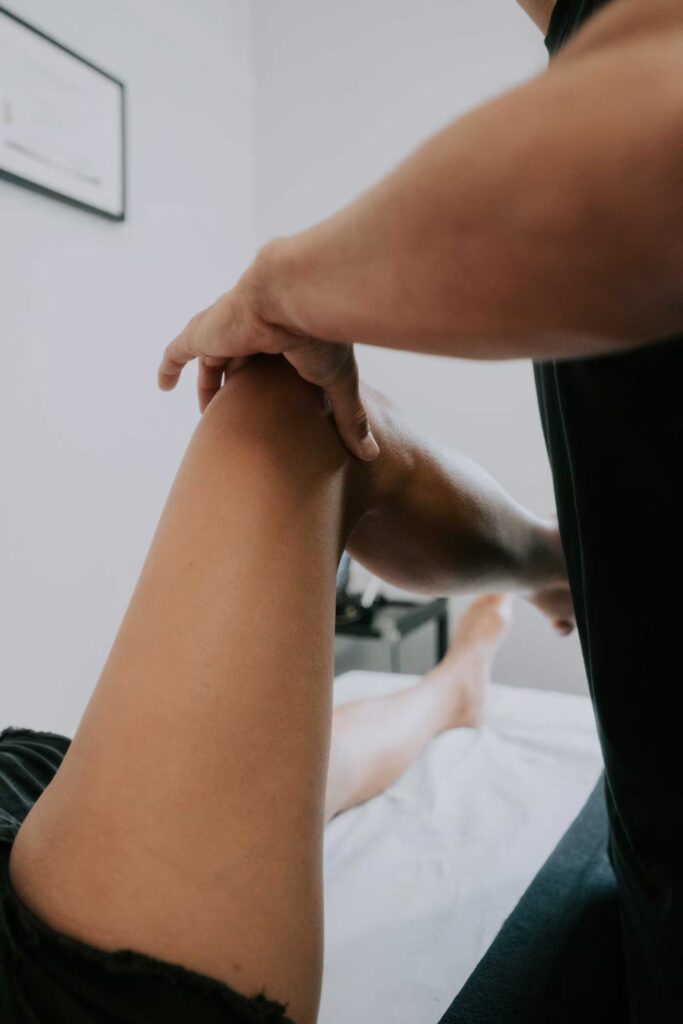
What are Muscle Tears?
Muscle tears and strains are common injuries that occur when a muscle is overstretched or overloaded, leading to pain, weakness and restricted movement. At Fit2Function Clinics in Oxford Circus and Covent Garden, we specialise in treating all grades of muscle injuries, from minor strains to partial tears, using Physiotherapy, manual therapy, advanced treatments and guided 1-to-1 rehab. Our goal is to help you heal effectively, move pain-free and return to activity stronger than before.
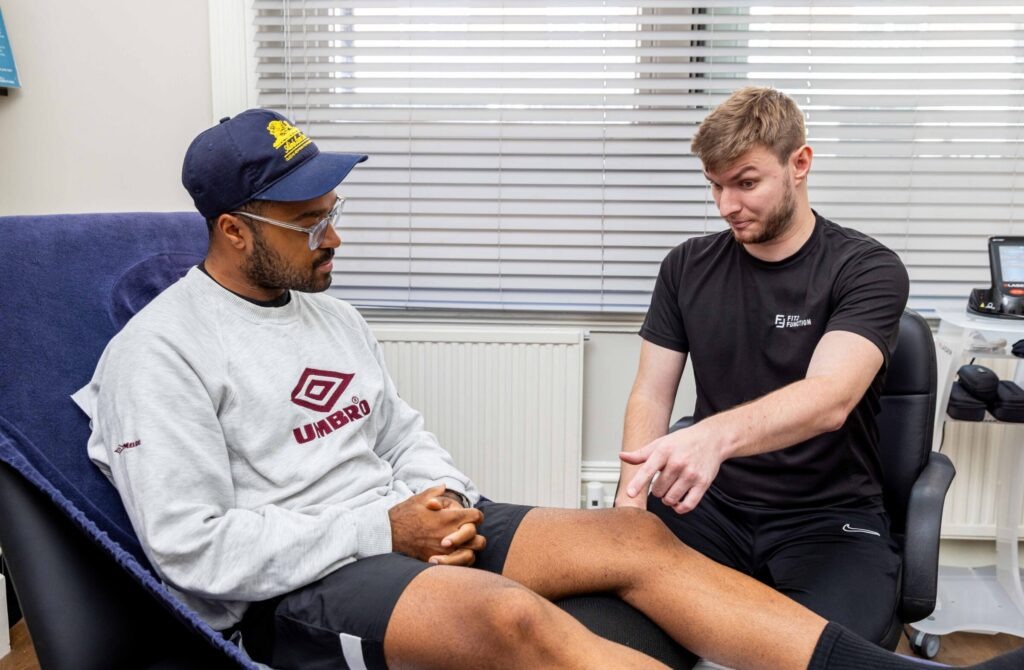
Effective Muscle Tear Treatment At Our Oxford Circus and Covent Garden Clinic
At Fit2Function, we offer personalised treatment for muscle tears and strains that goes beyond just rest and ice. After a thorough assessment, we create a structured rehabilitation plan that reduces pain, restores function and prevents reinjury. Our approach combines manual therapy, laser therapy, shockwave therapy, ems therapy, infrared cupping, progressive strength training and mobility work. Every treatment plan is tailored to the severity and location of the injury, as well as your goals, whether that’s returning to sport, exercise or daily function. Unlike generic rehab programmes, we closely track your progress and adjust as needed. With years of experience treating both athletes and non athletes, our Oxford Circus and Covent Garden clinic is trusted for its evidence based, hands on care and commitment to long-term results.
What Are The Common Causes Of Muscle Tears & Strains
Muscle tears and strains are typically caused by sudden movements, overloading or fatigue. Common causes include sprinting, jumping, lifting heavy weights or overstretching a muscle during activity. Strains often occur in muscles that cross two joints, such as hamstrings, calves or the lower back. Poor warm ups, muscle imbalances, tightness or lack of flexibility can increase the risk of injury. In some cases, repeated overuse or returning to sport too soon after a previous injury leads to a strain. At Fit2Function Oxford Circus and Covent Garden, we assess not just the injury itself, but the movement patterns and training habits that may have contributed, helping you recover smarter and stay injury free in the future.
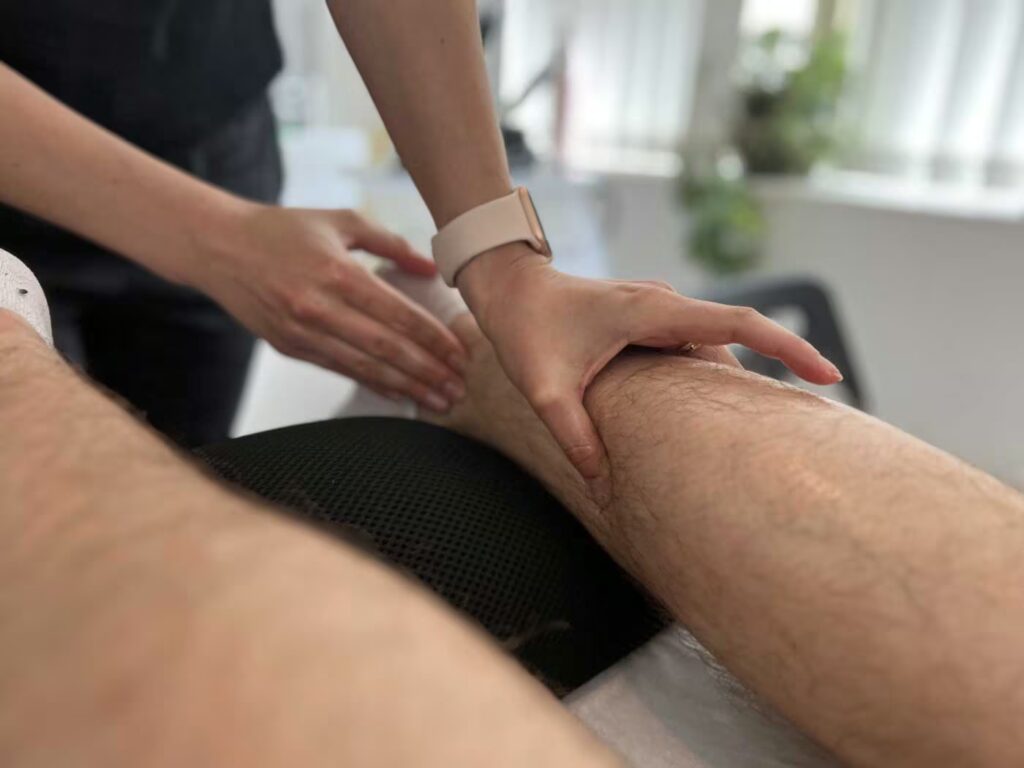
What Makes Us Different
At Fit2Function, we specialise in helping people recover from muscle tears and strains quickly, safely, and completely.
Since 2017, our clinic has helped thousands of clients across London return to pain-free movement , from runners and gym enthusiasts to office professionals and performing artists.
We take a comprehensive approach to rehabilitation that goes beyond rest and simple exercises. By combining traditional physiotherapy with advanced technology like Shockwave Therapy and Laser Therapy, we accelerate healing and reduce downtime significantly.
Our results speak for themselves, over 350 five-star reviews on Google and Doctify, and a 90% success rate within just six sessions.
Here’s what sets us apart:
- Advanced Assessment & Diagnosis – We use detailed clinical testing to identify the exact muscle involved and the severity of the injury.
- Evidence-Based Treatment – Every plan is based on the latest research and adapted to your specific needs.
- Modern Technology – Our advanced treatments stimulate tissue repair and speed up recovery.
- Individualised Care – No two injuries are the same. You’ll receive a tailored plan to get you back to your sport or activity.
- Time & Attention – Our 60-minute sessions allow us to deliver meaningful results, not rushed appointments.
- Support Beyond the Clinic – We provide exercise programs, recovery advice and check-ins to ensure your full recovery
We’re not just here to help your muscle heal, we’re here to help you come back stronger, move better, and prevent re-injury in the future.
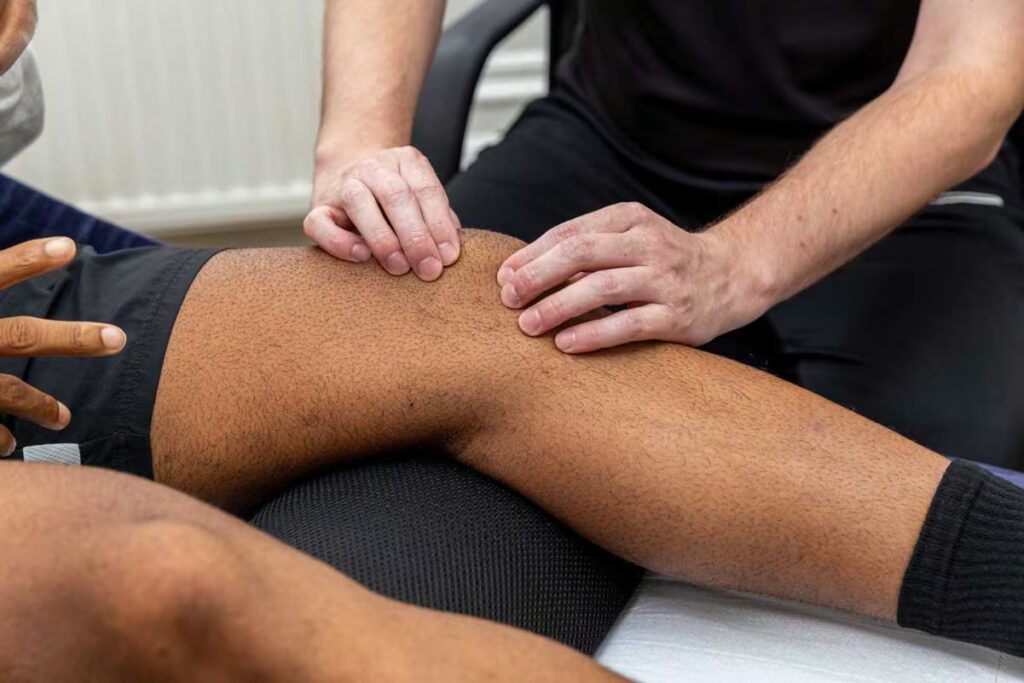
Benefits of Muscle Tears & Strains Treatment
Treatment for muscle tears and strains leads to faster recovery, stronger muscles and lower risk of re-injury. Clients often experience pain reduction within a few sessions, followed by improved movement, strength and confidence. We don’t just treat the symptoms, we address the root cause of your injury and provide the tools to prevent it from happening again. You’ll return to daily life, sport, or training with greater awareness, better posture and stronger movement patterns. At Fit2Function in Oxford Circus and Covent Garden, our rehab programmes are designed for real results, helping you move better, perform better, and stay pain-free in the long run.
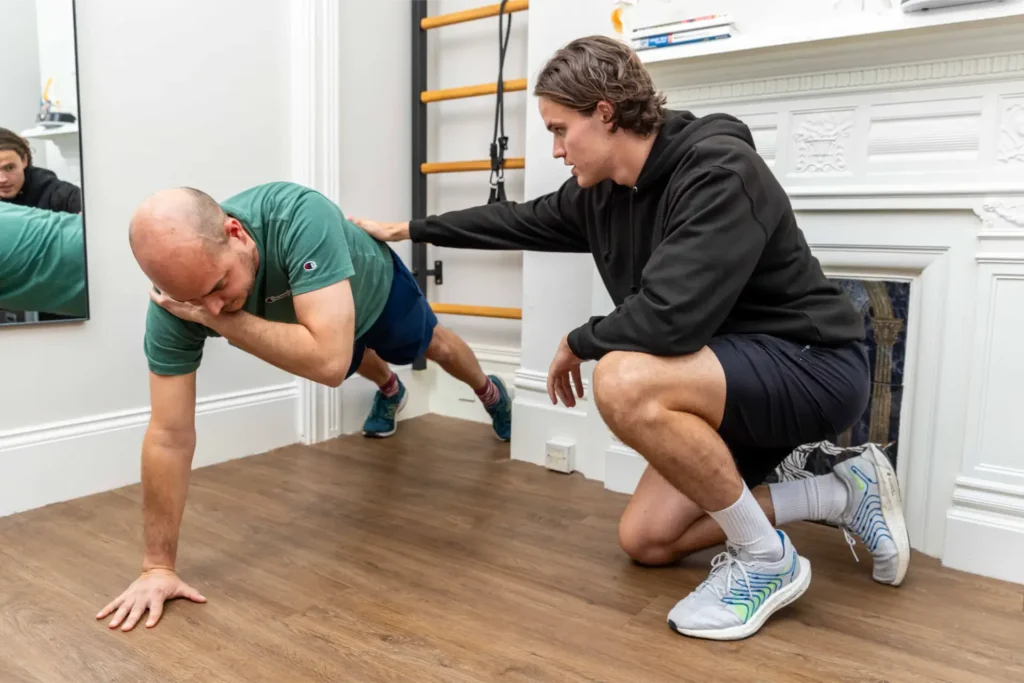
What To Expect On Your First Visit
During your first visit, we’ll focus on understanding your injury, beginning treatment, and giving you the tools for recovery.
- Detailed Consultation – We’ll discuss how the injury occurred, your symptoms, and any relevant history.
- Functional Assessment – We’ll examine muscle strength, flexibility and the affected area to determine the injury grade.
- Diagnosis & Explanation – You’ll receive a full breakdown of the injury, how long recovery may take and what to expect.
- First Treatment – Treatment typically starts in the first session to reduce pain, improve circulation and begin healing.
- Rehabilitation Plan – We’ll give you a tailored exercise and home-care program to maintain progress between visits.
We’ll make sure you understand your injury, the recovery process and how to return stronger than before.
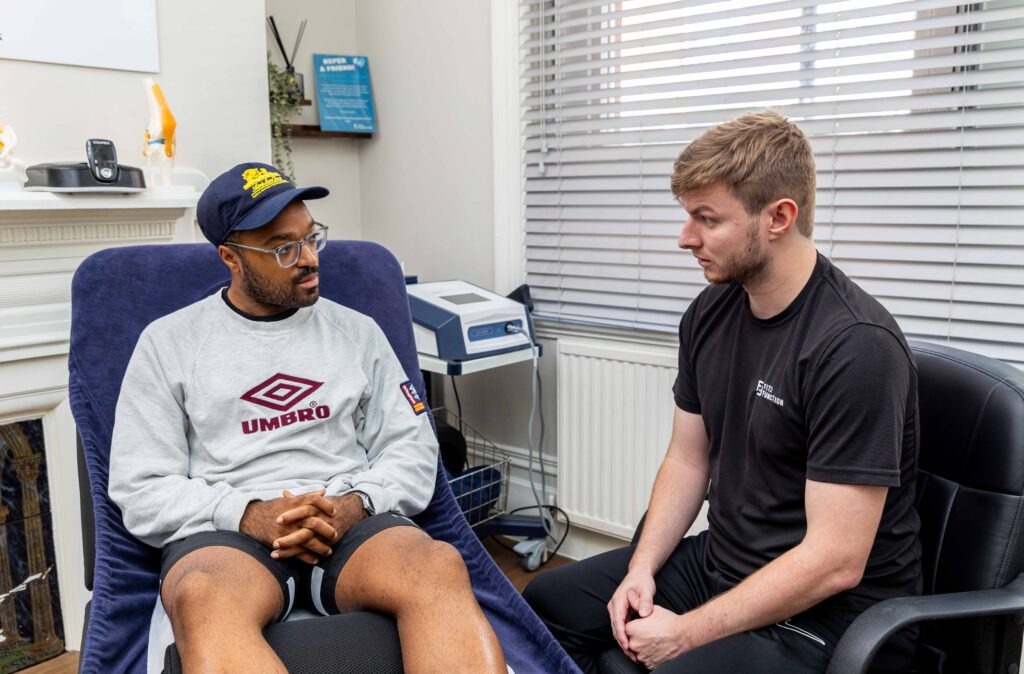
How To Book Your First Appointment
Getting started is simple:
- Click the “Book An Appointment” button on this page.
- Select your preferred practitioner, service and time.
- Attend your first session and begin your recovery journey.
Prefer to chat first? Call us at 02071172076 or fill out the contact form at the bottom of the page and we’ll happily guide you through the process.
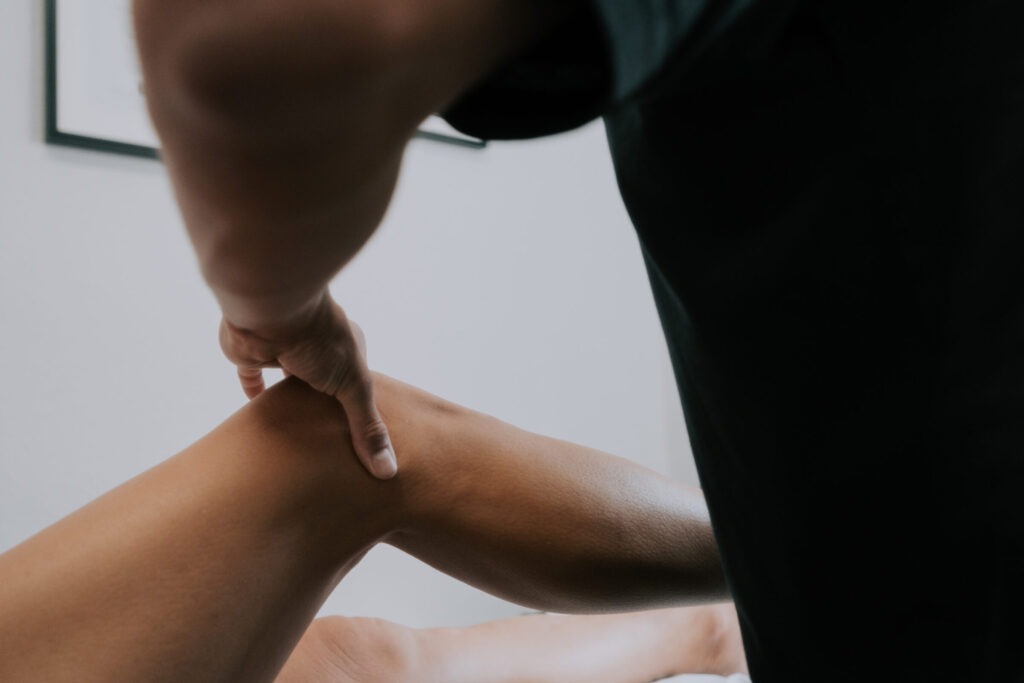
EXCELLENTTrustindex verifies that the original source of the review is Google. Very good laser treatment for lower back pain. Relieve a lot after the session.Posted onTrustindex verifies that the original source of the review is Google. Really impressed with George on my visit to F2F. Ankle has felt weak for a while now post sprain but already feeling better post treatmentPosted onTrustindex verifies that the original source of the review is Google. 5 stars is not enough for Anna! She is amazing.. not inky has she healed my shoulder she also healed my sons football injury! He is back playing in only a few weeks. ANNA also gave a plan which he can do along side his training to keep him fit! She is worth her weight in Gold!Posted onTrustindex verifies that the original source of the review is Google. I’ve been working with George at Fit to Function on and off over the past year, and I can’t recommend him enough. I was dealing with stubborn bicep tendinitis that just wouldn’t go away, but George completely sorted me out. Super friendly, knowledgeable, and genuinely helpful. I also love the new location — clean, professional, and easy to get to. If you’re struggling with any tendon issues, I highly recommend trying shockwave therapy here. It made a huge difference for me!Posted onTrustindex verifies that the original source of the review is Google. I’ve had some neck pain for a while, same with my right toe and thumb joint from football injuries. George and Conor were very welcoming. George really helped me in understanding the cause and telling me the right treatment before administering it. Completely recommend!Posted onTrustindex verifies that the original source of the review is Google. OMG amazing clinic, solved my issues and can run again. Thank you for your professionalism and attentiveness and such a warm atmosphere.Posted onTrustindex verifies that the original source of the review is Google. I went to Fit2Function for my ankle and had Anna Jancsurák as my Physiotherapist. She was amazing and so thoughtful and kind and very helpful in my rehabilitation. She explained everything very thoroughly and is very knowledgeable and showed me very helpful excersicesPosted onTrustindex verifies that the original source of the review is Google. I am currently being treated by Anna at Fit2Function for recurring knee issues. Anna is a fantastic physiotherapist: knowledgeable, professional, thorough and exceptional at her job. After only 3/6 sessions, and keeping up with physio outside of official appointments (don't skip this step), my legs are stronger and my knees no longer ache throughout my long, active workdays. I cannot recommend Anna enough, and I am safe in the knowledge that, should I ever have any body-related issues, I will be in safe hands with her.
Muscle Tears & Strains FAQs
What exactly is a muscle tear or strain?
A muscle strain (or tear) occurs when muscle fibres are overstretched or damaged due to excessive force. Strains are graded from mild (Grade 1) to severe (Grade 3), depending on the level of damage.
How can I tell if my injury is a muscle tear or just a minor strain?
Mild strains cause soreness and tightness, while tears usually involve sharper pain, swelling, bruising and weakness. A thorough clinical assessment is the best way to confirm the extent of your injury.
How long does it typically take to recover from a muscle tear?
Recovery times vary by severity. Mild strains may heal within 1-2 weeks, moderate tears may take 4-6 weeks, and severe tears may require several months of rehab.
Can I still exercise if I have a muscle strain?
In most cases yes, but exercise should be modified and guided by a professional. We help you stay active safely while avoiding further damage.
What should I do immediately after injuring a muscle?
Apply ice, rest the area and avoid aggravating movements. Seek a professional assessment as soon as possible so treatment and rehab can as early as possible
How can I prevent muscle tears in the future?
A thorough warm-up, strength training and flexibility work can all reduce your risk. We’ll assess your movement and give you a tailored injury prevention plan.